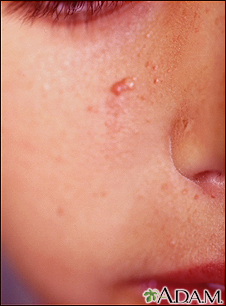Juvenile angiofibroma
Nasal tumor; Angiofibroma - juvenile; Benign nasal tumor; Juvenile nasal angiofibroma; JNA
Juvenile angiofibroma is a noncancerous growth that causes bleeding in the nose and sinuses. It is most often seen in boys and young adult men.
Images

I Would Like to Learn About:
Causes
Juvenile angiofibroma is not very common. It is most often found in adolescent boys. The tumor contains many blood vessels and spreads within the area in which it started (locally invasive). This can cause bone damage.
Symptoms
Symptoms include:
- Difficulty breathing through the nose
- Easy bruising
- Frequent or repeated nosebleeds
- Headache
- Swelling of the cheek
- Hearing loss
- Nasal discharge, usually bloody
- Prolonged bleeding
- Stuffy nose
Exams and Tests
The health care provider may see the angiofibroma when examining the upper throat.
Tests that may be done include:
- Arteriogram to see the blood supply to the growth
- CT scan of the sinuses
- MRI scan of the head
- X-ray
Biopsy is generally not recommended due to the high risk of bleeding.
Treatment
You will need treatment if the angiofibroma is growing larger, blocking the airways, or causing repeated nosebleeds. In some cases, no treatment is needed.
Surgery may be needed to remove the tumor. The tumor may be hard to remove if it is not enclosed and has spread to other areas. Newer surgery techniques that place a camera up through the nose have made tumor removal surgery less invasive.
A procedure called embolization may be done to prevent the tumor from bleeding. The procedure may correct the nosebleeds by itself, but it is most often followed by surgery to remove the tumor.
Outlook (Prognosis)
Although not cancerous, angiofibromas may continue to grow and damage nearby tissue or bleed. Some may disappear on their own.
It is common for the tumor to return after surgery.
Possible Complications
Complications may include:
- Anemia
- Pressure on the brain (rare)
- Spread of the tumor to the nose, sinuses, and other structures
When to Contact a Medical Professional
Contact your provider if you often have:
- Nosebleeds
- One-sided nasal blockage
Prevention
There is no known way to prevent this condition.
Related Information
Stuffy or runny nose – adultTumor
Invasive
Anemia
References
Chu WCW, Epelman M, Lee EY. Neoplasia. In: Coley BD, ed. Caffey's Pediatric Diagnostic Imaging. 13th ed. Philadelphia, PA: Elsevier; 2019:chap 55.
Fletcher CDM. Tumors of soft tissue. In: Fletcher CDM, ed. Diagnostic Histopathology of Tumors. 5th ed. Philadelphia, PA: Elsevier; 2021:chap 24.
Haddad J, Dodhia SN. Acquired disorders of the nose. In: Kliegman RM, St. Geme JW, Blum NJ, Shah SS, Tasker RC, Wilson KM, eds. Nelson Textbook of Pediatrics. 21st ed. Philadelphia, PA: Elsevier; 2020:chap 405.
Nicolai P, Mattavelli D, Castelnuovo P. Benign tumors of the sinonasal tract. In: Flint PW, Francis HW, Haughey BH, et al, eds. Cummings Otolaryngology: Head and Neck Surgery. 7th ed. Philadelphia, PA: Elsevier; 2021:chap 50.
Snyderman CH, Pant H, Gardner PA. Juvenile angiofibroma. In: Meyers EN, Snyderman CH, eds. Operative Otolaryngology: Head and Neck Surgery. 3rd ed. Philadelphia, PA: Elsevier; 2018:chap 122.
BACK TO TOPReview Date: 9/10/2023
Reviewed By: Josef Shargorodsky, MD, MPH, Johns Hopkins University School of Medicine, Baltimore, MD. Also reviewed by David C. Dugdale, MD, Medical Director, Brenda Conaway, Editorial Director, and the A.D.A.M. Editorial team.

Health Content Provider
06/01/2025
|
A.D.A.M., Inc. is accredited by URAC, for Health Content Provider (www.urac.org). URAC's accreditation program is an independent audit to verify that A.D.A.M. follows rigorous standards of quality and accountability. A.D.A.M. is among the first to achieve this important distinction for online health information and services. Learn more about A.D.A.M.'s editorial policy, editorial process and privacy policy. A.D.A.M. is also a founding member of Hi-Ethics. This site complied with the HONcode standard for trustworthy health information from 1995 to 2022, after which HON (Health On the Net, a not-for-profit organization that promoted transparent and reliable health information online) was discontinued. |
The information provided herein should not be used during any medical emergency or for the diagnosis or treatment of any medical condition. A licensed medical professional should be consulted for diagnosis and treatment of any and all medical conditions. Links to other sites are provided for information only -- they do not constitute endorsements of those other sites. © 1997- 2025 A.D.A.M., a business unit of Ebix, Inc. Any duplication or distribution of the information contained herein is strictly prohibited.
